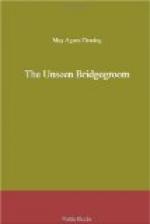People paused to look again at him—for he was a stranger there—but nobody recognized him, and Mr. Carl Walraven read his bill undisturbed.
The play was “Fanchon the Cricket,” and the bill announced, in very big capitals, that the part of Fanchon was to be played by that “distinguished and beautiful young English actress, Miss Mollie Dane.”
Mr. Walraven saw no more; he sat holding the strip of paper before him, and staring at the one name as if the fat letters fascinated him—“Fanchon, Miss Mollie Dane.”
A shrill-voiced bell tinkled, and the drop-curtain went up, and the household of Father Barbeaud was revealed. There was a general settling into seats, hats flew off, the noises ceased, and the play began.
A moment or two, and, in rags and tatters, hair streaming, and feet bare, on the stage bounded Fanchon, the Cricket.
There was an uproarious greeting. Evidently it was not Miss Dane’s first appearance before that audience, and still more evidently she was a prime favorite.
Mr. Walraven dropped his bill, poised his lorgnette, and prepared to stare his fill.
She was very well worth looking at, this clear-voiced Mollie Dane—through the tatters and unkempt hair he could see that. The stars in the frosty November sky without were not brighter than her dark, bright eyes; no silvery music that the heir of all the Walravens had ever heard was clearer or sweeter than her free, girlish laugh; no golden sunburst ever more beautiful than the waving banner of wild, yellow hair. Mollie Dane stood before him a beauty born.
Every nerve in Carl Walraven’s body thrilled as he looked at her. How lovely that face! How sweet that voice, that laugh! How eminently well she acted!
He had seen women of whom the world raved play that very part; but he had never, no, never seen it better played than he saw it to-night.
“She will make the world ring with her name if she adheres to the stage,” Carl Walraven said to himself, enthusiastically; “and she never will play anything better than she plays the ‘Cricket.’ She is Fanchon herself—saucy, daring, generous, irresistible Fanchon! And she is beautiful as the angels above.”
The play went on; Fanchon danced, and sobbed, and sung, and wept, and was mischievous as a scratching kitten, and gentle as a turtle-dove; took all the hearts by storm, and was triumphantly reunited to her lover at last.
I don’t know how many young men in that audience were left without an atom of heart, how many would have given their two ears to be in handsome Landry Barbeaud’s boots.
The roof nearly rose with the thunders of applause when the curtain fell, and Carl Walraven got up with the rest, his head whirling, his brain dizzy.
“Good Heaven!” he thought, stumbling along the dark, chilly streets to his hotel, “what a perfectly dazzling little witch she is! Was there ever such another sparkling, bewildering little fairy in the world before?”




